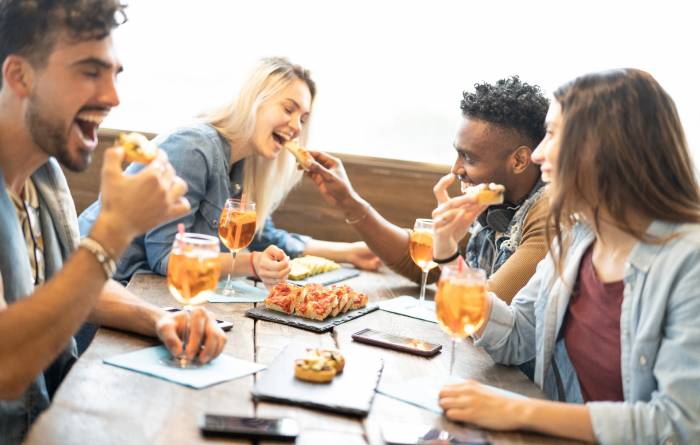Gen Z in Italy Sees Wine as Social, but 58% Fear Mistakes and 51% Find It Too Technical
Younger drinkers seek authenticity, sustainability, and immersive experiences, driving demand for new approaches to wine tourism and communication
2025-11-12

At the Be Travel Onlife (Bto) 2025 event held at Stazione Leopolda in Florence, new research presented by Ipsos Doxa and Wine Tourism Hub has shed light on how Generation Z in Italy relates to wine. The findings reveal that for young people, wine is primarily about sharing, conviviality, and a connection to the local area. However, many members of this generation feel excluded from the world of wine due to its technical language and perceived exclusivity.
According to the survey, 64% of Gen Z respondents associate wine with sharing, 65% with conviviality, and 51% with a sense of place. Despite this positive association, 38% admit they do not understand much about wine, and 58% say they are afraid of making mistakes when talking about it. Over half (51%) see the wine world as too technical and reserved for experts. Analysts suggest that this is more a problem of language than content: young people are interested in wine but seek more direct, visual, and participatory ways to engage with it.
The research was discussed during the panel “Ponti di Gusto - Come l’enogastronomia connette le generazioni in viaggio,” which focused on how food and wine tourism connects generations. The event also highlighted Italy’s continued status as the most desired destination for a “dream vacation,” ahead of the United States and Australia. This appeal remains strong even among repeat visitors, indicating that Italy’s charm continues to grow.
The data points to a need for change in how wine is communicated to younger generations. Generation Z drinks less but makes more considered choices. This is not due to disinterest but reflects a new awareness. Seventy-five percent of young alcohol consumers say they actively moderate their intake, often choosing lighter or non-alcoholic alternatives. Health concerns and personal image play a significant role in these choices, influenced by social media trends that emphasize well-being.
Economic factors also matter: the ideal price range for a bottle of wine among young people is between 10 and 25 euros. This suggests that value is more important than luxury for this demographic. Digital socializing has reduced traditional drinking occasions but increased the desire for authentic experiences that can be shared online. Positive sentiment toward Italian food and wine on the web reaches 86%, higher than tourism (81%), made in Italy (83%), or culture (84%). Among high-income groups, wine is seen as Italy’s top sector of excellence (56%), followed by tourism (50%) and fashion (46%).
Moderation does not mean distance from wine culture; rather, it reflects a search for authenticity and coherence. According to Ipsos Global Trends 2024, 82% of Italian consumers believe brands can be profitable while supporting good causes, and 68% are willing to pay more for sustainable products. Another Ipsos study for Fondazione Symbola found that 58% of Italians link sustainable wine production with higher quality, especially when it results in better taste (48%), ethical business practices (33%), and care for employees and communities (30%). The most important stage for sustainability is seen as cultivation (55%), followed by packaging and disposal (over 40%). For young consumers, sustainability signals value rather than cost.
Wine tourism is emerging as the most natural way for young people to approach wine. However, Wine Tourism Hub reports that 39% find winery experiences too similar and too long, 38% consider them boring, and 37% think they are too technical. There is growing demand for shorter, more dynamic, and immersive experiences such as picnics among the vines, sunset tastings, music events, art installations, and social gatherings. These activities transform wineries from classrooms into stages where young people can connect with wine in new ways.
Ipsos Future4Tourism data shows that over the next five years there will be a 7% increase in interest in authentic local experiences and a 6% rise in food and wine experiences, driven mainly by younger travelers.
Lavinia Furlani, president of Wine People, explains that Generation Z is not uninterested in wine but does not identify with how it is currently presented. She says they do not want to be educated but involved through spontaneous, visual storytelling where wine becomes an excuse to share moments together.
Roberta Milano, scientific coordinator at Bto, adds that “wine is the grammar of new tourism” and serves as a language through which Italy can express authenticity, landscape, and innovation using vocabulary shared across generations. She notes that today’s value lies not just in products but in relationships between people, businesses, and regions. Food and wine tourism acts as a bridge connecting these worlds.
Founded in 2007, Vinetur® is a registered trademark of VGSC S.L. with a long history in the wine industry.
VGSC, S.L. with VAT number B70255591 is a spanish company legally registered in the Commercial Register of the city of Santiago de Compostela, with registration number: Bulletin 181, Reference 356049 in Volume 13, Page 107, Section 6, Sheet 45028, Entry 2.
Email: [email protected]
Headquarters and offices located in Vilagarcia de Arousa, Spain.